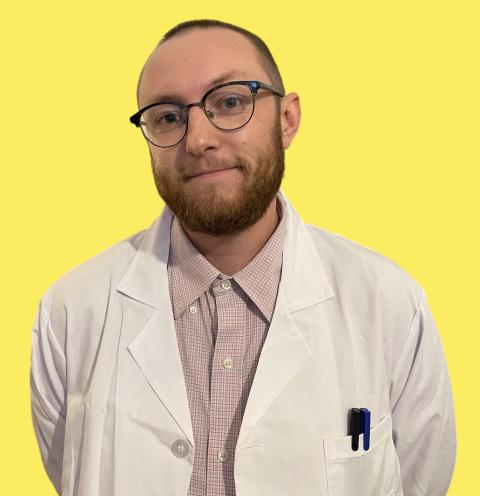Inside the lab with CF researcher Ryan
Hi Ryan. When did you first start learning about cystic fibrosis?
I can remember going to university lectures on ‘ion channels’ and, as part of that, learning about the CF protein. I chose to do my final year project looking at the CF protein and testing how it interacts with different chemicals, with the hopes of improving future medicines in CF. (This was during the very early stages of CFTR modulators!).
I learnt about a different area of CF research for my Master’s degree, looking at the CF lung infection-causing bacteria Burkholderia cepacia and how it can be manipulated to reduce its harmfulness in humans. From there, I took the wider skills I learnt from studying bacteria that cause infections and applied them to studying bacteria that live naturally in our intestines (also known as our guts or GI tract).

What is your current research all about?
I’m interested in the bacteria in our intestines, known as the gut ‘microbiota’ or microbiome. We know that compared to healthy volunteers from the wider public, people with CF have alterations in their gut bacteria; for example, people with CF might have different types of bacteria.
People with cystic fibrosis experience a wide range of problems at the site of the GI tract, with many experiencing GI symptoms daily. As part of the wider GRAMPUS-CF Strategic Research Centre (SRC), we are investigating the complex links between gut microbiota and GI symptoms in people with CF.
How could your research benefit people with CF in the future?
By understanding these complex relationships in people with CF, we hope to unveil potential avenues for personalised therapeutic interventions or, at the very least, understand if (and how) we can effectively modulate the microbiota in people with CF to improve their quality of life.
What’s a typical day like in the lab?
My day is usually really flexible. I can choose the hours that suit me and my frame of mind. Depending on what’s happening with the research and the samples arriving, I can do different things each day.
One day I might be sitting in front of a computer, analysing DNA sequencing data, or doing some statistical analysis with the radio on; another day, I might be sitting in the lab for 10 – 12 hours.
In the lab, I process faeces (poo) samples from people with CF to analyse the bacteria and metabolites present. To do this, I’ll isolate the DNA from the bacteria and the chemicals they produce as they grow and survive. I’ll use a ‘PCR’ machine to increase the amount of specific DNA before analysis with state-of-the-art DNA sequencing machines. (You may remember ‘PCR’ from COVID tests – it is the same technique in both!).
I also get to meet CF clinicians, and chatting with them on site visits is enjoyable. I hear from them about the difference that our research is making, and that’s a great feeling.
What do you love most about working in research?
I love that there is so much variety, and I do different things every day. Working in CF research allows me to use a wide range of techniques to try and answer important questions. It keeps me on my toes!
The deep sense of collaboration and partnership among researchers, clinicians, and people in the CF community is really fulfilling for me. It reaffirms the power of bench-side discoveries to translate into real-world solutions for individuals with CF.
How has the Trust supported your career?
The Trust has directly enabled the development of my research career through funding my PhD and my current research role. Aside from this, events organised by the Trust, such as the annual UKCFC conference, have enabled me to present my findings, share ideas, and form research collaborations with other like-minded researchers in the field.
It's thanks to our incredible supporters that we can continue to be at the cutting edge of CF research. Making breakthroughs and discoveries that change lives for the better. Now and in the future. But we know this is just the start. Incredible progress has been made, but there is still a long way to go until everyone with CF can truly live a life unlimited. We won’t stop until we can all lead the lives we want. Until cystic fibrosis stops challenging, damaging or shortening lives. And you can be part of it.
Donate today and help us unite for a life unlimited.

Wear Yellow Day
Wear Yellow Day will be returning Friday 16 June 2023. Register your interest today!
